
Who's Next is the fifth studio album by English rock band the Who, released on 2 August 1971. It developed from the aborted Lifehouse project, a multi-media rock opera conceived by the group's guitarist Pete Townshend as a follow-up to the band's 1969 album Tommy. The project was cancelled owing to its complexity and to conflicts with Kit Lambert, the band's manager, but the group salvaged some of the songs, without the connecting story elements, to release as their next album. Eight of the nine songs on Who's Next were from Lifehouse, the lone exception being the John Entwistle-penned "My Wife". Ultimately, the remaining Lifehouse tracks would all be released on other albums throughout the next decade.
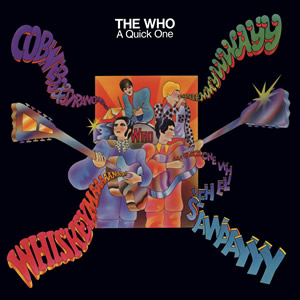
A Quick One is the second studio album by the English rock band the Who, released on 9 December 1966. A version of the album with an altered track listing was released under the name Happy Jack on Decca Records in April 1967 in the United States, where the song "Happy Jack" was a top 40 hit.

The Who Sell Out is the third studio album by the English rock band the Who. It was released on 15 December 1967 by Track Records in the UK and Decca Records in the US. A concept album, The Who Sell Out is structured as a collection of unrelated songs interspersed with fake commercials and public service announcements, including the second track "Heinz Baked Beans". The album purports to be a broadcast by pirate radio station Radio London. The reference to "selling out" was an intended irony, as the Who had been making real commercials during that period of their career, some of which are included as bonus tracks on the remastered CD.

Live at Leeds is the first live album by English rock band the Who. It was recorded at the University of Leeds Refectory on 14 February 1970, and is their only live album that was released while the group were still actively recording and performing with their best-known line-up of Roger Daltrey, Pete Townshend, John Entwistle and Keith Moon.
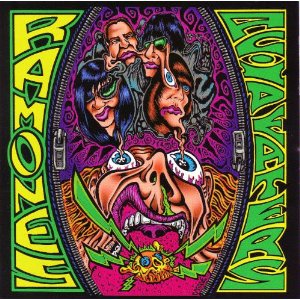
Acid Eaters is the thirteenth studio album by the American punk rock band Ramones.

Empty Glass is the second solo studio album by English rock musician Pete Townshend, and his first composed of original material, released on 21 April 1980 by Atco Records.

The Who by Numbers is the seventh studio album by English rock band the Who, released on 3 October 1975 in the United Kingdom through Polydor Records, and on 6 October 1975 in the United States by MCA Records. It was named the tenth-best album of the year in The Village Voice Pazz & Jop critics poll.

It's Hard is the tenth studio album by English rock band the Who. Released in September 1982, it was the final to feature bassist John Entwistle, who died in 2002. It was also the second and final Who studio album with drummer Kenney Jones, as well as the last to be released on Warner Bros. Records in the US. It was released on Polydor Records in the UK, peaking at No. 11, and on Warner Bros. in the US where it peaked at No. 8 on the Billboard Pop Albums chart. The US rights to both this album and Face Dances subsequently reverted to the band, who then licensed them to MCA Records for reissue. The album achieved gold status by the RIAA in the US in November 1982. It was their last album for over two decades until Endless Wire in 2006.

White City: A Novel is the fourth solo studio album by English rock musician Pete Townshend, released on 11 November 1985 by Atco Records. The album was produced by Chris Thomas and it was recorded by Bill Price at three separate recording studios in London, England: both of the Eel Pie studios, and A.I.R.

Face Dances is the ninth studio album by English rock band the Who. It was released in 1981 by Warner Bros. in the United States and on Polydor in the United Kingdom. It is one of two Who studio albums with drummer Kenney Jones, who joined the band after Keith Moon's death three years earlier.

Meaty Beaty Big and Bouncy is a compilation album of singles by English rock band the Who, released in 1971 as Track 2406 006 in the UK and as Decca DL 79184 in the US. It entered the US Billboard 200 chart on 20 November 1971, peaking at number 11, and the UK chart on 3 December 1971, peaking at number 9.

Odds & Sods is an album of studio outtakes by British rock band the Who. It was released by Track Records in the UK and Track/MCA in the US in October 1974. Ten of the recordings on the original eleven-song album were previously unreleased. The album reached No. 10 on the UK charts and No. 15 in the US.

Manifesto is the sixth studio album by English rock band Roxy Music. It was released in March 1979 by E.G. in the United Kingdom, Polydor in Europe and Atco in the United States.
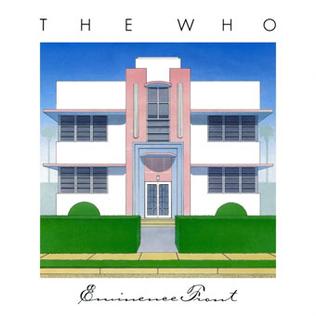
"Eminence Front" is a song by the Who, written and sung by lead guitarist Pete Townshend. It appears as the sixth track on the group's 1982 studio album, It's Hard. The single entered Billboard Hot 100 on 25 December and reached number 68.

Rockit is the nineteenth studio album by Chuck Berry, released in 1979 by Atco Records. It was his only release for the label, following Berry's departure in 1975 from Chess Records and his last studio album for 38 years, until Chuck in 2017.
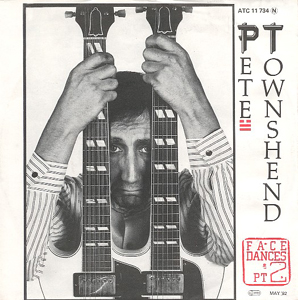
"Face Dances, Pt. 2" is single written and composed by Pete Townshend, most famously known as the guitarist for the Who. The song appears on Townshend's 1982 solo album All the Best Cowboys Have Chinese Eyes.

"Slip Kid" is a song from the Who's seventh album, The Who by Numbers. Written originally for Pete Townshend's shelved Lifehouse rock opera, "Slip Kid" was revived in 1975. The song was originally written as a warning about the music business, though Townshend has pointed out the song's relevance in different contexts. The song was released as a single in the US, backed by "Dreaming from the Waist", but failed to chart.
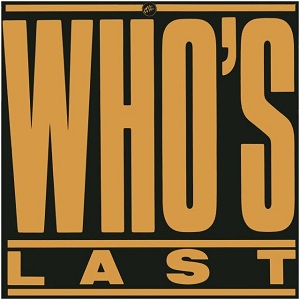
Who's Last is the second live album by British rock band The Who, recorded in 1982 during what was then billed as the band's "farewell tour". Thus, this album, released in 1984, was to be the band's last album.

Join Together is a box set of live material released from The Who's 1989 25th Anniversary Tour. Several of the tracks were recorded at Radio City Music Hall, New York, and at Universal Amphitheatre, Los Angeles, with the rest from various other concerts during the tour.
"Blue, Red and Grey" is the eighth song on the Who's 1975 album The Who by Numbers. An acoustic ballad featuring the song's writer, Pete Townshend, on lead vocals, the song is generally considered one of the lighter songs on the album.



















